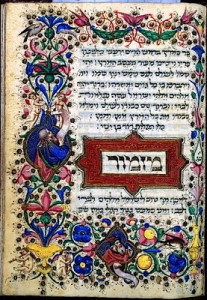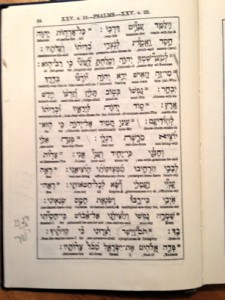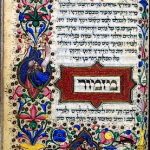Praying the Psalms
An Introduction.
 Many years ago, back in the days when I was in Seminary, I picked up an Interlinear Hebrew-English Psalter.
Many years ago, back in the days when I was in Seminary, I picked up an Interlinear Hebrew-English Psalter.
It’s one of the best purchases I’ve ever made.
It’s a small, slim volume, a 1974 Zondervan reprint of a much older edition published by Samuel Bagster & Sons Ltd. in London. The correct title is: The Interlineary Hebrew and English Psalter in which The Construction of Every Word is Indicated, and the Root of Each Distinguished by the Use of Hollow or Other Types.
I liked the little book immediately, because it is printed in a way that clearly indicated the Hebrew roots and constructions. I knew immediately that I’d made a good purchase.
But, it was many years before I actually put it to any regular use.
Somewhere, some time, I learned to use the Psalms as my Prayer Book. I no longer remember when I stumbled across this technique of prayer. For years I had found it hard to spend extended periods of time in prayer. My mind wandered — of course — as everyone’s does. Silence was comforting to me at first. But, the time would often pass slowly. And, some days I seemed to have nothing to say.
I began to pray the Psalms.
I would read a verse or two. I would meditate upon it. I would pray. I would intercede for the many people on my heart. And, at the point where I caught my mind wandering (as it so naturally does) I would come back to the Psalm again. The process would begin again.
And, this is where my Interlinear Hebrew and English Psalter came in so handy. It allowed me to actually meditate on the original words of the Psalm. It forced me to slow down. It forced me to read each word. It forced me to reconstruct the meaning of the sentences. It suggested new possibilities of meaning that I might not have seen in translation.
 You can see how well used it is from this picture I took of a sample page. The slash markings in the text are to show me where I stopped reading last time, so I can pick up from there again. You will also notice that I have sometimes circled particular words — and I’ve written some notes in the margins.
You can see how well used it is from this picture I took of a sample page. The slash markings in the text are to show me where I stopped reading last time, so I can pick up from there again. You will also notice that I have sometimes circled particular words — and I’ve written some notes in the margins.
I continue to use the original languages in my Bible study, in part because it forces me to slow down and take notice of details. I’m actually not as proficient as I’d like to be — especially with Hebrew — but as I continue to work with the Biblical languages I don’t (at least) lose whatever knowledge I have. Interlinear Bibles help me out a lot because my knowledge of the vocabulary is quite limited — again, especially with Hebrew.
But, what if you don’t know any Hebrew? No problem!
People who don’t know Hebrew can do a similar thing by reading the Psalms from a very literal translation like the old New American Standard Bible (1971). Again, what this does is slow you down as you read. What we are practicing here is a meditative reading — what people sometimes call Lectio Divina.
As I slowed down my reading of the Psalms, things began to change.
I began to feel that my prayers were a dialogue with God. I spoke to God. I listened for the echo of God speaking in the Psalm.
Now it feels like I hear the Psalms in an echo chamber. I don’t know how else to describe it. It echoes with the history of Israel. It echoes with the life of David, and so many ancient hopes that were pinned on him. It echoes with all the varied emotions of the human heart: joy, laughter, sorrow, despair. It echoes down through all the history of the Christian faith, as believers have turned to these ancient songs for guidance and inspiration. Because I see the Psalms through a Christ-lens, they yield levels of meaning to me because I see them in the light of a certain, particular fulfillment.
And, in that sense I’m not alone. These songs of faith and devotion, doubt and despair, are the property of a community of faith that has read and cherished them through ages of time.
And, here they lie in front of me. Ancient words, carefully preserved by Masoretic scribes, who added markings so that even their accents and pronunciations might be preserved. It’s really quite amazing if you think about it.
My God,
Thank you for the gift of the Word
and these particular words
very human and yet divine
an ancient and living part of your redemptive plan
a gift to me today.
Lord,
I do not understand
my prejudices and preconceptions run deep
I am so quick to defend my ideas
so often arrogant and fearful
(maybe they are the same thing)
I am easily distracted;
Inspire me
Teach me your ways
May your Word
find an entrance into my heart today. Amen.












4 Responses
Comments are closed.